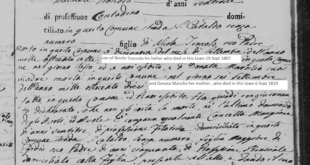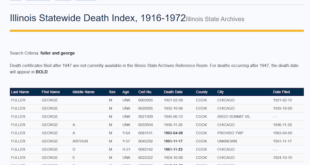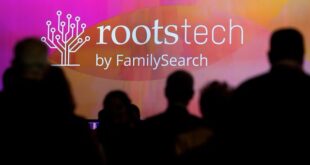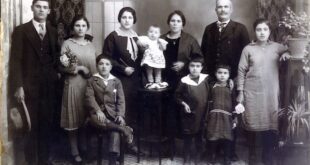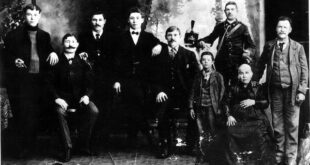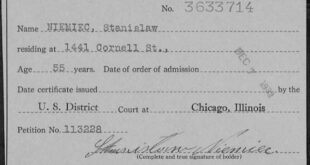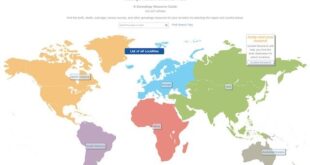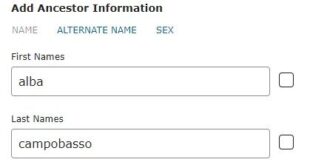After more than three decades of Italian research, I thought I knew it all. Actually, I know I don’t — know it all — but I also don’t spend a lot of time looking again at the same records I have already reviewed and set to rest. Recently I saw a YouTube interview by Bob Sorrentino on his “Italian Roots and Genealogy” channel. I was interviewed for this channel about a year ago on the topic of “Researching Triggiano to Chicago.” A number of notable Chicagoans like Dominic Candeloro and Carla Simonini have also been on this channel. But a …
Read More »A good place to dig when looking for a gravesite
Let’s pretend we’re at a trivia contest and the next question is, “What’s the word for someone who has an interest in cemeteries?” You could answer “cemetery enthusiast” or “grave hunter” but those would be wrong because the question asks for a single word. It turns out that the word is “taphophile” pronounced “TAF-oh-file.” The moniker has a Greek root, “taphos,” which is a catch-all word for anything to do with funerals, burials, etc. It can be part of the ritual of the death of a loved one to attend a wake, drive in procession to a church and then …
Read More »Online options when searching for vital records
Recently, I was asked to do a presentation on Cook County Vital records. For anyone who has relatives in Chicago and the suburbs, this is an essential part of research. Vital Records are a specific subset of the many types of records available to genealogists. No matter what part of the country or the world you research, vital records are: Birth certificates Marriage Licenses Death certificates Because they form the backbone of our research, we need them the most. Before there were web sites, we used to have to order copies of these documents from the Cook County Clerk’s office. …
Read More »Annual conference teaches best tech practices
I haven’t taken a trip for genealogy purposes for some years. I used to go to Salt Lake City for one week a year to do research on microfilm, but now that those films are available on FamilySearch.org, I don’t need to spend the money to fly and stay at a hotel anymore. However, I did fly to SLC for a conference called RootsTech, which is a huge gathering of genealogists and computer tech people. Unlike conferences hosted by the Federation of Genealogical Societies or the National Genealogical Society, which are designed to link up local genealogy groups and train …
Read More »To grow your family tree, start with the roots
Last month, we discussed how the Italian naming traditions can be used to help create the entire family tree more easily. You can guess the names of grandparents and search for marriages of people with the correct first names without even knowing them from an official document, just because they have grandchildren with those names. Also you can tell which children were alive and when, based on how the later children were named. We also started talking about stillbirths, mostly because they fill out the family and you can then say that you have a complete family tree. When I …
Read More »Why are so many people in our family named Joseph?
We always talk about the “old days” when we followed traditions the family held onto, mostly in reference to food, family gathering, religious practice etc. These are all a great part of our family history, but they don’t help us with our genealogy research. Some of those traditions are so ingrained that they are never talked about. They just “are.” One of the areas of ‘tradition’ we look at as genealogists is the way our Italian families named their children. Even if we grow up Italian and choose to not research the family tree, if we see a chart made …
Read More »Where and how to dig up naturalization petitions
Last month we were looking for the town of birth of our ancestor using American records, for those of us who may not know the exact small town our Italian ancestors came from. We were able to use one search method on FamilySearch to simultaneously find the naturalization records and passenger lists. Last month I showed you: www.familysearch.org, “search”, “records”, “type”, “immigration and naturalization.” Let’s start with the difficulties of looking for naturalization petitions. As I mentioned last month, there’s no guarantee your ancestor became a citizen. As I forgot to mention last month, there may be no petition for …
Read More »How to track down your Italian towns of origin
Many Fra Noi readers were born in Italy, or their parents were. They have the easy task of knowing what town the family came from. And then there are the rest of us. When I was much younger, my Polish grandmother told me that her family came from Krakow and my Italian grand-aunt told me that her family came from Bari. Both were close, but no Toscano cigar! Neither one realized that you need to know the actual small town your family came from to adequately conduct genealogical research. The nearby big city is not good enough. Italy managed its …
Read More »Exploring FamilySearch.org’s Research Wiki
Before the internet, people at a local bar would argue about who hit more home runs, Willie Mays or Willie McCovey. Since there was no place to look up the answer, the winner would be the guy who had the hardest punch! Once we had internet access on smart phones, we go to Wikipedia and settle the factual debate without anyone getting a bloody nose. Genealogy methods are not as clear cut as looking up sports statistics, but FamilySearch.org has an entire section of the web site dedicated to looking up how to research a particular locality, small or large. …
Read More »A decennial gift
Genealogists get a gift once a decade. Every ten years, the federal government takes the census, and 72 years later they release the full results to the public for use in genealogy research. Most people only remember the census as the time when the government asks us how many toilets we have etc. Most of us will probably not live long enough to see those census returns 72 years later. But last year we were given our decennial gift: the 1950 U.S. Census. When I started genealogy in the 1990s, there was basically no internet, and the census records certainly …
Read More » Fra Noi Embrace Your Inner Italian
Fra Noi Embrace Your Inner Italian

